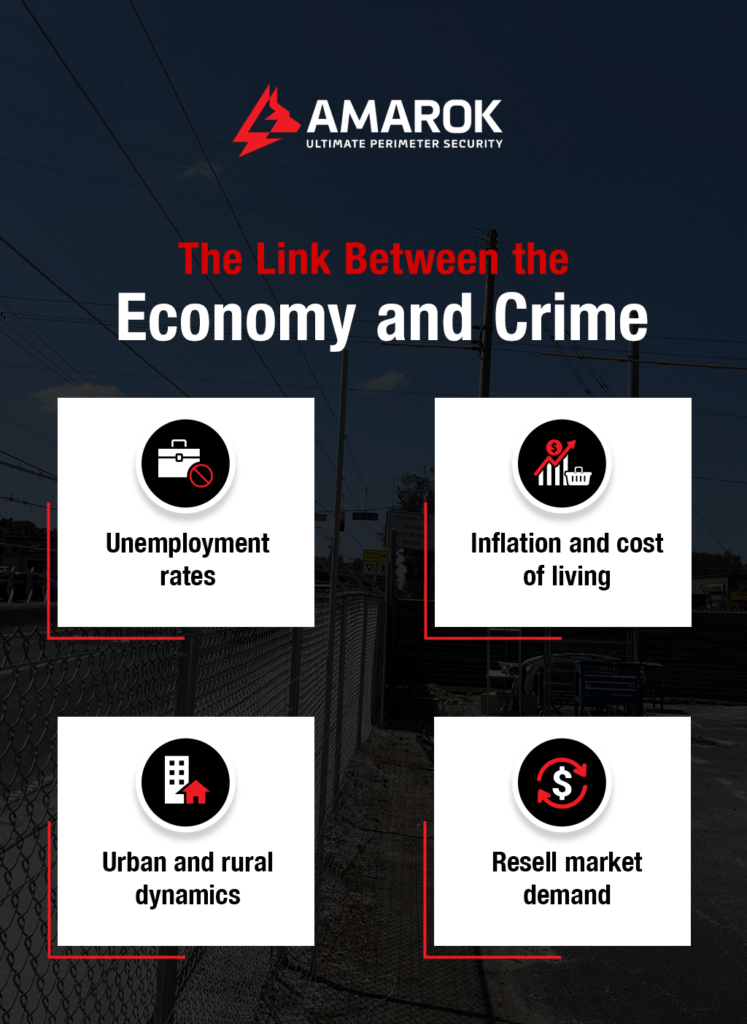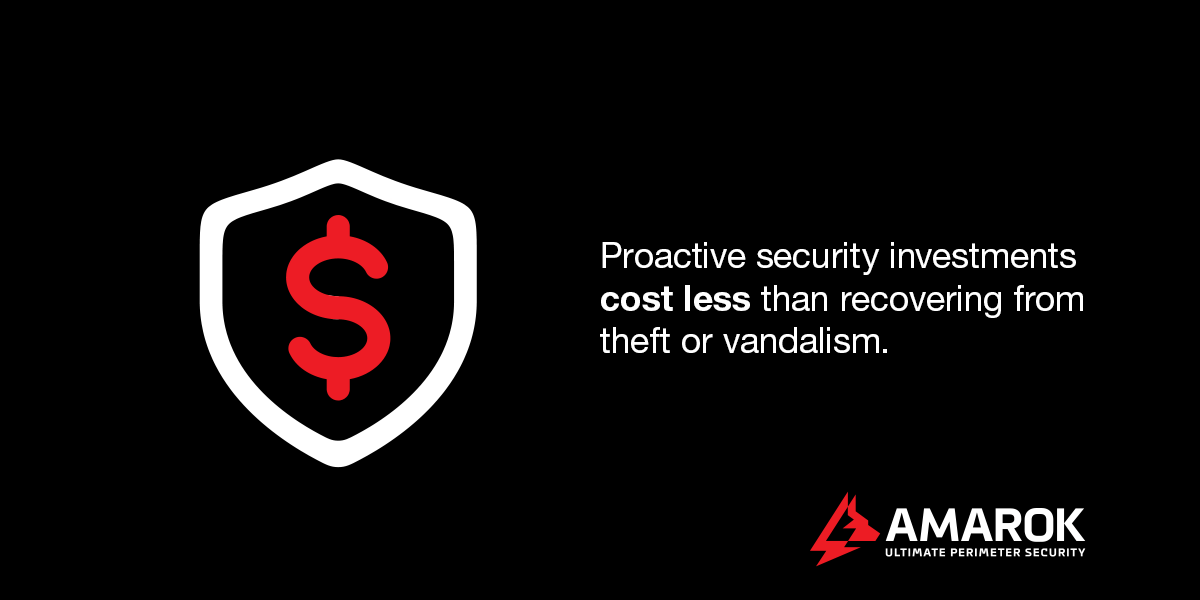Crime and the economy are closely related. Economic downturns often lead to higher property crime rates in the commercial sector. As companies cut costs and unemployment rises, crimes like external theft increase. Vacant properties, reduced security budgets, and lower foot traffic create ideal conditions for theft, vandalism, and trespassing. Understanding these trends is critical for businesses looking to protect their assets using a multi-layered perimeter security strategy.
The Link Between the Economy and Crime

The economy and crime rates have a strong correlation, as a recession or downturn increases unemployment. Economic pressures often force organizations to cut non-essential costs, including video surveillance or access control systems. Thieves exploit these weaknesses since they know businesses are less protected.
Economic trends that drive this exploitation include:
- Unemployment rates: As the economic inequality gap increases, so does the number of property crimes. Warehouses, construction sites, and industrial facilities become easy targets, especially after hours.
- Inflation and cost of living: Rising prices erode purchasing power when essentials like food, gas, and housing become less affordable. Shoplifting and break-ins increase, and businesses may also face higher losses as a result of internal theft.
- Urban and rural dynamics: Densely populated areas and cities are top targets for crime, as economic downturns in these areas affect more people.
- Resell market demands: During economic stress, there is a rise in demand for stolen goods like building materials, equipment, and industrial supplies. Thieves target commercial properties as a result, knowing they can resell stolen items quickly and easily.
Anticipating these changes allows organizations to better protect their assets, reduce losses, and maintain profitability. Rising prices can increase the value of construction materials as well as industrial equipment and machinery. Supply chain disruptions create shortages, making stolen goods easier to sell. And as a result, storage yards, jobsites, and warehouses storing these items are targets for theft.

Community and Economic Development
Economic growth and urban development directly affect commercial property crime — both in positive and negative ways.
Cities investing in business districts, infrastructure, and public safety often see lower property crime rates. The creation of new jobs often equates to greater access to more resources for more of the population. Well-lit streets and increased police presence help deter theft and vandalism by making it harder for would-be criminals to take action undetected.
At the same time, as neighborhoods redevelop, property values go up and new businesses move in — which can lead to higher crime rates. Opportunistic theft increases as high-value equipment and materials become more accessible. Temporary vacancies in redevelopment zones and transitioning areas also invite trespassing and vandalism. Zoning laws, permitting processes, and law enforcement policies also influence commercial crime rates.
In the wake of increased community and economic development, businesses in the construction, equipment rental, logistics, and warehousing industries must implement proactive measures to help protect their facilities and assets.
Strategies for Businesses to Mitigate Risks
Proactive security investments cost less than recovering from theft or vandalism. But a single security measure is not enough. Criminals adapt quickly, so businesses need a layered security approach. This method combines multiple deterrents and lines of defense, making properties harder to exploit. A multi-layered physical security strategy reduces the risk of external theft and protects assets in any economy.
The following measures should be implemented as part of an integrated perimeter security plan:
Electric Fencing
An electric fence is the foundation of perimeter security, acting as an intimidating barrier to deter crime and protect your assets. If a would-be intruder attempts to breach the fence, they receive a medically safe but memorable shock. The Electric Guard Dog™ Fence uses pulsed electricity every 1.3 seconds, which makes it safe. Electric fencing can be integrated with other measures like remote monitoring, so you receive alerts of a potential breach and benefit from real-time 24/7 protection.
Video Surveillance
High-resolution security cameras and motion-activated recording triggered by the electric fence alarm ensure continuous visibility. This security measure allows stakeholders to monitor their perimeter remotely around the clock. Capturing criminal activity in real time can help alert the authorities as well as aid in investigations and prosecutions. In addition, AI-powered analytics can detect suspicious activity and alert security personnel.
Alarm-Based Lighting
Well-lit exteriors and clear sightlines can help deter break-ins since criminals feel more exposed. Alarm-based lighting solutions that integrate with electric fencing provide illumination when the fence alarm is triggered. When the alarm is activated, it sets off a rapid response and activates the lighting system, which helps deter intruders and sends alerts to security personnel about the potential threat.
Access Control
In addition to an electric fencing system, controlled access points and monitored gates help prevent unauthorized entry. Gate Access Control can be installed at the gate using measures like credential readers and license plate recognition. With a building intrusion detection system, you can safeguard your facilities by protecting any entry point with wireless motion detection and door contacts.
Employee Training
Well-trained employees can recognize suspicious behavior and follow security protocols to help prevent losses. During economic downturns, there is often an increase in organized crime and external theft as well as internal theft.
Security awareness training programs teach staff members how to spot risks and remain vigilant in an effort to prevent external theft. To help reduce losses due to internal theft, create and enforce policies like strict inventory controls and other accountability measures.
In addition, employees should complete emergency response training so they know how to react safely and effectively if an incident should occur.
Community Partnerships
Collaborating with local law enforcement and neighborhood watch groups can help increase security and aid in crime prevention. Business coalitions can share intelligence with community leaders as a way to identify crime patterns and coordinate emergency responses. Direct communication with police also ensures faster intervention as response times improve.
Implement Multi-Layered Perimeter Security Solutions from AMAROK
By understanding economic crime trends and implementing comprehensive site security measures, businesses can safeguard their commercial properties against evolving threats. A unified perimeter security approach not only deters crime but also reduces liability risks and protects long-term business stability.
Protect your commercial or industrial property during any economic climate with AMAROK — 99% of our customers experience zero external theft post-installation.
Contact us for a threat assessment today. Our perimeter security experts will identify potential vulnerabilities and develop a proactive approach to prevent and deter theft on your property.





